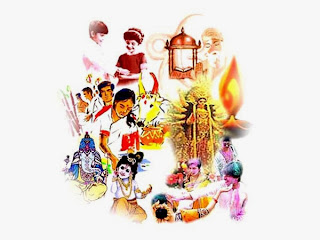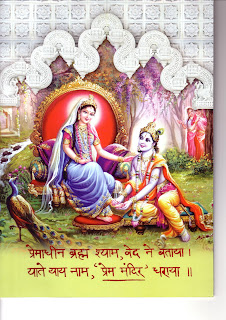Jagadguru Divas 2011

(Synopsis of a talk given by Jagadguru Shri Kripalu Ji Maharaj at Bhakti Dham, Mangarh, India, on January 14, 2011, explaining this kirtan verse.)
Hari Guru bhaju nit Govinda Radhey,
bhava nishkam ananya bana dey.
This verse contains the essence of all spiritual philosophy. It mentions four points:
(1) Hari Guru bhaju – The scriptures do not prescribe that our worship should be to God alone. Yasya deve para bhaktir yathe deve tatha gurau. The Vedas explain that the Guru should be worshiped with the same devotion as God. Devotion to both is compulsory.
(2) Nit – Many people practice devotion, but only for a short time. This is like saving $10 and spending $20, or washing your clothes once with soap and afterward making them dirty ten times. If you do this, your clothes will never become clean.
First, we don’t practise devotion properly. Even if we do practise devotion for an hour or two, we do it pridefully. People observe with some awe, “Do you know that person is a tax collector and he worships God for one full hour?” But just ask him what he did during that time. He recited the Hanuman Chalisa or the Shiva Chalisa or Durga Chalisa. He did a little japa. This isn’t devotion.
Even if someone were to properly practice devotion for one hour, afterward he virtually becomes an atheist. How is this so? Just consider one small point, which we need to bring into our understanding: Shri Krishna is seated in our hearts. This is stated everywhere in the scriptures and everyone knows this. “God resides within all!” But how many truly realise this? This realisation should be continuous or nit, not just for 10 minutes, half an hour or 23 hours.
For example, we feel a continuous sense of “I am.” We know the same ‘me’ that existed yesterday is the same ‘me’ that observed dreams while we were sleeping, and it is the same ‘me’ that is existing now. Just as we have a continuous sense of “I am”, we should continuously realise with full confidence that our divine Father, our soul-beloved God is seated in our hearts. If we do this, then we are a true believer.
If we should forget this, even for just a minute, then we start having private thoughts, “No one knows what I’m thinking right now!” There are even those who sit before their Guru and silently criticise him. It may be that the Guru doesn’t know what his disciple is thinking, but God is still dwelling in that person’s heart. He forgot this point.
In fact, everyone forgets this. This is everyone’s shortcoming, regardless of how knowledgeable they are. For this reason, Kripalu has written ‘nit‘ – devotional remembrance of God and Guru should be continuous.
(3) Bhava nishkam - 99% of the devotion that people are engaged in is selfish. There is a huge crowd at a particular temple. Why has everyone gone there? Because the form of God worshiped there performs miracles! On this basis, some temples collect millions in gold. A person places a heap of gold before a statue of Sai Baba. He explains, “God blessed me – I just won the lottery! So, of course, I have to give God a percentage.”
This is selfish devotion. If such a selfish devotee encounters the slightest hardship, “Oh Lord! Hear my cry! My son is very sick.” But your Guru taught you to be selfless – so selfless that even at the point of death you should not request God, “Let me live.” Your material attachments to your family and relations have made you forget spiritual philosophy.
(4) Ananya - People worship a god or goddess, then someone convinces them they should instead practise tantric meditation, so they leave their worship and start that. Then they go to the shrine of a deceased holy man where huge crowds gather and they also worship there.
People pilgrimage to such places simply due to hearsay. The holy man who left this world is gone now. If he was a Saint, he has gone to Golok, God’s abode. What did he leave behind? Just his mortal remains which must have decomposed by now. Still people are convinced, “He performs great miracles!” Even presidents and prime ministers frequent such places.
When we worship celestial gods and goddesses and also supreme God, this means we still don’t understand who is the supreme divine power. If we did understand, then why don’t we worship Him alone? This just means we don’t understand spiritual philosophy, even though we have listened to it a lot. Spiritual philosophy has been explained to us in every age. We have listened to it, understood it and then forgotten it.
So we have to constantly reflect on these four points and practise them. Without practise, neither God nor Guru will give you anything. God Himself is already seated in your heart; what are you receiving from Him? Even if a person were to find a true Saint and stay with him 24-hours a day, this doesn’t automatically guarantee anything. Everything is dependent on practise.
Thus these four important points have been incorporated in this verse:
Hari Guru bhaju – worship God and Guru with the same devotion;
Nit – your remembrance of God and Guru should be continuous;
Bhava niskham – your devotion should be selfless;
Ananya - your devotion should be exclusive
If you forget the philosophy of the scriptures, by simply remembering these two lines you could attain your spiritual aim.



Comments
Post a Comment